Where the 2020 presidential candidates stand on marijuana legalization

If there's one thing that united Democrats and Republicans in the Reagan era (besides their unfortunate fixation with perms), it was their near universal hatred of weed. Everybody was a cop back then. Walter Mondale, the Democratic candidate for president in 1984, called for another "War on Drugs" — all drugs. Ronald Reagan, for his part, believed that marijuana was "probably the most dangerous drug in the United States."
Fast forward to the 2020 election, when politicians have largely done an about-face, at least when it comes to weed. Politicians aren't just campaigning for medical marijuana, they're advocating for recreational marijuana to be legalized: explicitly, vocally, and on their campaign pages.
Were it not for the hundreds of thousands of people arrested for marijuana law violations every year, it's almost like the past 40 years of aggressive anti-marijuana drug policy didn't exist.
Here's what Daniel Mallinson, assistant professor of public policy and administration at Penn State Harrisburg, thinks of the tectonic political and cultural shift on marijuana legalization:
"It started in the liberal states. There was a big political shift there that has since shifted to more conservative, battleground states — specifically when it comes to medical marijuana," Mallinson told Mashable in a phone interview. "Even the majority of Republicans now support some form of legalization. That's a rapid political shift among individuals that's now being captured in state policy and brought to the national level."
Recreational marijuana is now legal in 10 states and Washington, DC, while medical marijuana is legal in 33. And the remarkable historical progress is only expected to grow.
Mallinson isn't surprised to see Democratic candidates latching onto this issue:
"Democrats are all jostling to be the most progressive right now. At least the ones who have declared already," Mallison said. "You have to check a box for marijuana legalization if you want to run in that space."
SEE ALSO: Emergency pet marijuana calls are up by 765%
Will recreational marijuana legalization help candidates in the general election? Mallinson isn't so sure. The current 2020 presidential candidates have a range of views on the issue, not all of them exactly alike. Here's where each presidential candidate stands on legalized marijuana, and where they once stood — as much as they might try to deny it.
2020 Democrats
Where the Democratic candidates stand on marijuana legalization
Amy Klobuchar

Image: stephen maturen/Getty Images
Minnesota will be voting on recreational marijuana in 2019. Despite widespread public support, it's unclear whether the bill will pass and where Democratic Senator Amy Klobuchar will stand. The candidate from Minnesota is considered one of the more centrist of the pack. And her position on legalization is somewhat more muddled than that of her opponents.
Klobuchar has signed onto the "Strengthening the Tenth Amendment Through Entrusting States (STATES) Act," which protects states that have legalized marijuana from federal meddling. So has Massachusetts Senator Elizabeth Warren. Unlike Warren, however, Klobuchar has not signed onto the Marijuana Justice Act, which would remove marijuana's classification as a schedule 1 drug in the Federal Controlled Substances Act.
Klobuchar has supported cannabis research in the past, especially as it applies to medical research. Although, its classification as a schedule 1 drug makes this nearly impossible. It's much harder for scientists to obtain legal samples of the drug when it's classified this way.
Her record on marijuana as Minnesota's Attorney General is much more conservative. In 2016, she was given a "D" rating by NORML (the National Organization for Reform of Marijuana Laws), indicating a "hard on drugs" stance.
Bernie Sanders
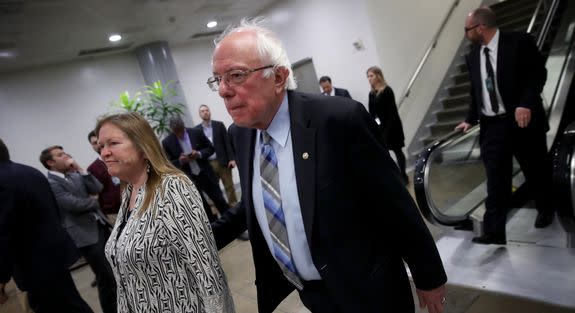
Image: win mcnamee/Getty Images
Vermont Senator Bernie Sanders hails from one of the most liberal states in the country. In 2019, recreational marijuana was made legal in Vermont — not through a referendum, but through a vote in the state legislature. Vermont became the first state in the country to legalize marijuana using this route.
Sanders has long advocated for marijuana reform. In 1995, he co-sponsored a bill in the House that would authorize medical marijuana in cases of "life-threatening" and "sense-threatening" illness. In the decades following, Sanders became one of the most vocal advocates for marijuana reform. Four years ago, Sanders filed the first bill in the Senate to end cannabis prohibition. He has signed onto New Jersey Senator Cory Booker's Marijuana Justice Act and called for the de-scheduling of the drug.
Sanders has also demanded banking reform, hoping to make it easier for legal marijuana businesses to operate accounts. In 2016, Sanders became the first major presidential candidate from both parties to call for removing marijuana from the list of controlled substances.
He is largely considered to be one of the most marijuana-friendly candidates running for president.
Cory Booker
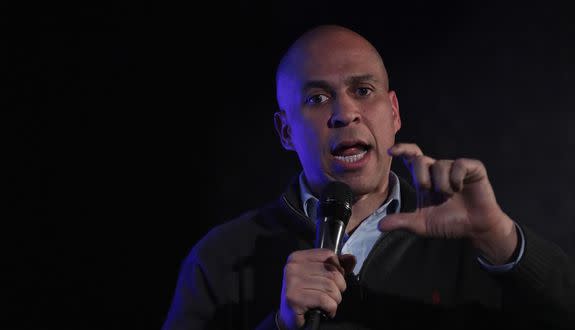
Image: scott olson/Getty Images
New Jersey Democratic Senator Cory Booker is one of the more progressive candidates when it comes to marijuana reform. It helps that he comes from a progressive state. In November of of 2018, New Jersey's state Senate and Assembly passed legislation easing the way for marijuana legalization. Governor Phil Murphy is now working with Senate President Stephen Sweeney to establish a more formal path for legalization and government regulation and taxation of the drug.
They should have Booker's support. In 2017, Booker authored the Marijuana Reform Act, which had multiple, historic, and radical elements: expunging convictions for those prosecuted for marijuana-related offenses, punishing states for disproportionately targeting groups of people (historically, that's people of color), and legalizing the drug on a federal level.
People who were serving federal sentences for marijuana-related offenses would be eligible for re-sentencing, presumably for a lighter sentence.
It was a transformational piece of legislation that could have improved the lives of millions of people. But it never made it out of the Senate, thanks to a secure Republican majority.
Every current Democratic presidential candidate who is also serving in the Senate has signed onto Booker's legislation, with the exception of Minnesota Senator Amy Klobuchar.
Unlike other senators on this list, Booker has a strong record on legalization. As far back as 2012, Booker, then mayor of Newark, New Jersey, decried the drug wars, accusing the federal government of "pouring huge amounts of our public resources into this current effort that is bleeding our public treasury and unnecessarily undermining human potential."
Elizabeth Warren
These guys make my heart happy. pic.twitter.com/g8OK42DcKL
— Elizabeth Warren (@ewarren) February 12, 2019
Massachusetts Senator Elizabeth Warren comes from a progressive, marijuana-friendly state, so it's not surprising that she's one of the most vocal advocates for legalization. In 2016, Massachusetts voted to legalize cannabis recreationally and in November of 2018, began selling cannabis to adults.
Warren has taken her advocacy to a federal level. Along with Senator Cory Gardner of Colorado, Warren is one of the lead sponsors of the STATES Act, which protects states in which marijuana is legal from federal interference. Cannabis is still illegal on the federal level.
She's also signed onto multiple major drug policy reform bills, including the Marijuana Justice Act, a transformative piece of legislation that would financially punish states that fail to legalize marijuana and who disproportionately incarcerate or arrest people for marijuana-related offenses.
Because of the legal status of marijuana on the federal level, cannabis companies are often barred from using federally-backed banks. Like Sanders, Warren has supported cannabis-related banking legislation, designed to push the industry away from cash-only models and integrate it with the modern banking system, where it's safer for businesses and will be better monitored.
Warren might look like the model of marijuana reform now, but it wasn't always that way. In her 2013 campaign against Republican Dan Winslow, she came at her opponent with this accusation: "He has a 100-percent ranking from the gun lobby and he’s for the legalization of marijuana. He wants us armed and stoned."
Julián Castro

Image: Edward omelas/Getty Images
Democrat Julián Castro hails from Florida, where only medical marijuana is legal. Recreational marijuana legalization is a long way off — advocates are currently working to ease access to medical marijuana, which was only made legal in 2016.
Castro previously served in Obama's White House as the Housing and Urban Development Secretary. Consequently, he doesn't have a Congressional voting record on marijuana, making his views a bit harder to decipher.
Castro has previously made social media posts in support of at least partial legislation. Two years ago in a Facebook post, he discouraged the federal government from cracking down on recreational marijuana crimes.
A mistake. Colorado and other states have shown we can sensibly legalize marijuana with reasonable controls. https://t.co/MknXhJ0cnr
— Julián Castro (@JulianCastro) February 26, 2017
Castro has also said he supported voters passing marijuana legalization laws by state.
It'll be interesting to see how Castro can distinguish himself in an already crowded Democratic field.
Kamala Harris
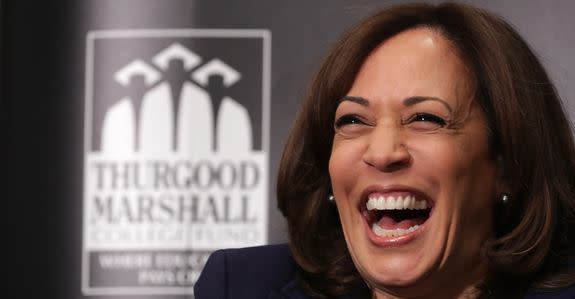
Image: chip somodevilla/Getty Images
Oh, California Senator Kamala Harris. Harris, who now admits she both smoked marijuana and inhaled it in the past, wasn't always an advocate for legalization. Her home state, meanwhile, has been one of the drug's most vocal advocates: a whopping 57.1 percent of voters voted yes on Proposition 64 in 2017 to legalize marijuana.
It took until 2015 for the former attorney general to come out in support of medical marijuana. Back in 2014, she laughed in the face of a local news reporter who asked if she supported legalizing recreational marijuana.
Harris has a new book in which she advocates for clearing the criminal records for people convicted of non-violent marijuana offenses, as well as for legalizing the drug.
The senator has come a long way from her earlier, more prosecutorial days, but it may not be enough to make some legalization advocates happy.
Kirsten Gillibrand

Image: alex wong/Getty Images
New York Senator Kirsten Gillibrand has one of the most liberal voting records in the Senate. It's easy for Gillibrand to hold this position, given her home state's support for the drug (New York is poised to become the 11th state to legalize recreational cannabis). And while we personally don't know if she's ever smoked, Gillibrand has signed her name to several key pieces of marijuana reform legislation, including Booker's Marijuana Justice Act.
She'e been outspoken about the effects of drug war policy and the racial inequities in the criminal justice system, even prior to announcing her candidacy.
DOJ should investigate how pharma helped create the opioid crisis, not institute policies that take marijuana based medicines from patients and needlessly target non-violent minority youths.
— Kirsten Gillibrand (@SenGillibrand) January 4, 2018
Marijuana laws in this country are discriminatory and unjust – and communities of color are paying the price. Congress needs to pass the Marijuana Justice Act to finally address the decades of harm caused by our failed drug policies.
— Kirsten Gillibrand (@SenGillibrand) August 25, 2018
Discriminatory drug policies rob black and Latino families of their futures. I’m fighting to help right this wrong, but I need 254 more people to stand with me before 11:59 p.m. tonight. Sign the petition to urge Congress to decriminalize marijuana.
— Kirsten Gillibrand (@SenGillibrand) August 9, 2018
After starting her career as a conservative, Blue Dog Democrat, Gillibrand has leaned hard to the left in recent years. I expect her to follow her party's progressive wing on this issue in the years to come.
Pete Buttigieg
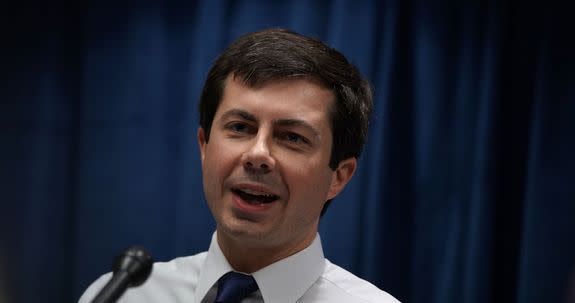
Image: alex wong/Getty Images
Pete Buttigieg is one of the least-known potential Democratic candidates on this list. As a result, the chances of him winning the nomination are slim.
Buttigieg hasn't spoken on a national stage about his views on marijuana legalization. However, he is largely considered a progressive in the city of South Bend, Indiana, where he serves as mayor. His home state of Indiana is far more conservative: Neither recreational marijuana nor medical marijuana are legal in the state, and progress on the issue has been slow.
A representative from Buttigieg's office told Mashable that the mayor supports legalization.
Tulsi Gabbard
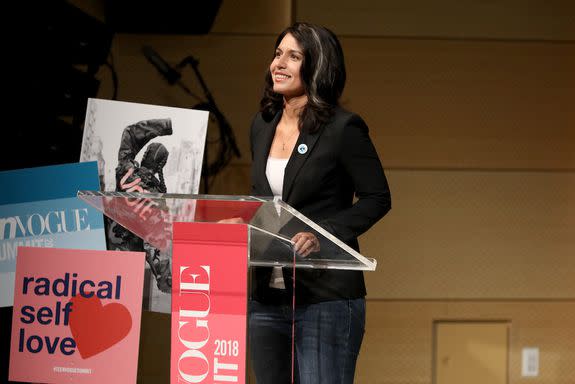
Image: Getty Images for Teen Vogue
Currently, the Hawaiian legislature is considering marijuana legalization. And, questionable views on Assad aside, Hawaiian Congresswoman Tulsi Gabbard is the one most progressive candidates when it comes to marijuana legislation. According to Marijuana Moment, she was lead sponsor on a bill that would require the government to research the effects of marijuana legalization on a state level.
She has called on the federal government to decriminalize marijuana, encouraged the federal government to fund additional research on medical marijuana, publicly explored the relationship between opioid abuse and punitive marijuana laws, and slammed former Attorney General Jeff Sessions for taking a regressive approach to drug policy.
Gabbard is one of the most visible advocates for legalized marijuana in the field, even if her presidential polling numbers are currently very low.
2020 Independents and Republicans
Where the candidates outside the Democratic Party stand on marijuana legalization
Howard Schultz

Image: santiago felipe/Getty Images
Howard Schultz comes from progressive roots: His home state of Washington was the first in the country to legalize recreational marijuana in 2012. That being said, Pop-Tarts got more likes on Twitter than Starbucks CEO Schultz did when they announced that they were running for president, so I'm not entirely sure we need to be concerned with a Schultz presidency. Because Schultz has no political experience to speak of, his views on the marijuana issue are unclear.
He is, however, the founder behind the Frappuccino, which is its own kind of intoxicant. So there's that.
We have reached out to Schultz for comment and have not yet received a response.
Donald Trump

Image: michael reynolds-pool/Getty Images
Prior to becoming elected, Trump said he believed marijuana legalization should be left up to the states. In New York, Trump's liberal home state, Governor Andrew Cuomo plans to legalize the recreational drug (medical marijuana is already legal) and establish an Office of Cannabis Management.
Upon becoming president, however, Trump appointed Jeff Sessions as attorney general. Sessions proceed to lift a critical Obama-era marijuana policy that made it clear that the federal government would not intervene with states who had legalized marijuana.
In 2017, White House Press Secretary Sean Spicer said the Trump administration was considering strengthening anti-marijuana enforcement on a federal level.
It's unclear whether the president will be a candidate in 2020, depending on his incarceration status, but it's important to keep his political worldview (absolute ideological chaos) in mind.
Even if there's a Democratic president in office, it'll be hard to push comprehensive marijuana reform, depending on the partisan makeup of Congress. Still, it's an exciting time for marijuana advocates. A record 6 in 10 Americans now support legalization, following a decade of steady progress on the issue.
Change will happen — in fact, it's already happening.
We'll be updating this post as more candidates announce their runs for office.
WATCH: World Health Organization calls to reclassify weed

